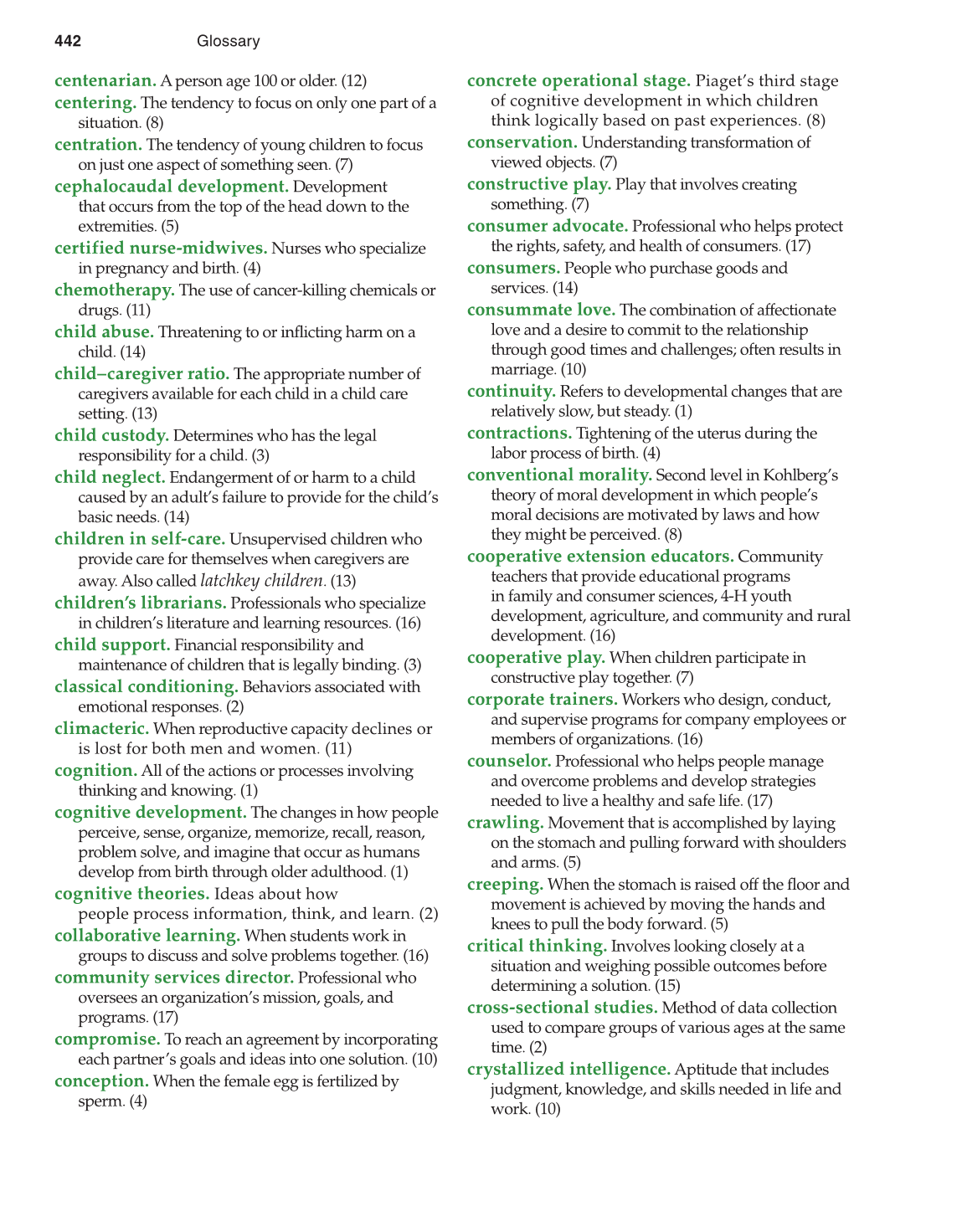442 Glossary
centenarian.
A person age 100 or older. (12)
centering.
The tendency to focus on only one part of a
situation. (8)
centration.
The tendency of young children to focus
on just one aspect of something seen. (7)
cephalocaudal development.
Development
that occurs from the top of the head down to the
extremities. (5)
certified nurse-midwives.
Nurses who specialize
in pregnancy and birth. (4)
chemotherapy.
The use of cancer-killing chemicals or
drugs. (11)
child abuse.
Threatening to or inflicting harm on a
child. (14)
child–caregiver ratio.
The appropriate number of
caregivers available for each child in a child care
setting. (13)
child custody.
Determines who has the legal
responsibility for a child. (3)
child neglect.
Endangerment of or harm to a child
caused by an adult’s failure to provide for the child’s
basic needs. (14)
children in self-care.
Unsupervised children who
provide care for themselves when caregivers are
away. Also called
latchkey children.
(13)
children’s librarians.
Professionals who specialize
in children’s literature and learning resources. (16)
child support.
Financial responsibility and
maintenance of children that is legally binding. (3)
classical conditioning.
Behaviors associated with
emotional responses. (2)
climacteric.
When reproductive capacity declines or
is lost for both men and women. (11)
cognition.
All of the actions or processes involving
thinking and knowing. (1)
cognitive development.
The changes in how people
perceive, sense, organize, memorize, recall, reason,
problem solve, and imagine that occur as humans
develop from birth through older adulthood. (1)
cognitive theories.
Ideas about how
people process information, think, and learn. (2)
collaborative learning.
When students work in
groups to discuss and solve problems together. (16)
community services director.
Professional who
oversees an organization’s mission, goals, and
programs. (17)
compromise.
To reach an agreement by incorporating
each partner’s goals and ideas into one solution. (10)
conception.
When the female egg is fertilized by
sperm. (4)
concrete operational stage.
Piaget’s third stage
of cognitive development in which children
think logically based on past experiences. (8)
conservation.
Understanding transformation of
viewed objects. (7)
constructive play.
Play that involves creating
something. (7)
consumer advocate.
Professional who helps protect
the rights, safety, and health of consumers. (17)
consumers.
People who purchase goods and
services. (14)
consummate love.
The combination of affectionate
love and a desire to commit to the relationship
through good times and challenges; often results in
marriage. (10)
continuity.
Refers to developmental changes that are
relatively slow, but steady. (1)
contractions.
Tightening of the uterus during the
labor process of birth. (4)
conventional morality.
Second level in Kohlberg’s
theory of moral development in which people’s
moral decisions are motivated by laws and how
they might be perceived. (8)
cooperative extension educators.
Community
teachers that provide educational programs
in family and consumer sciences, 4-H youth
development, agriculture, and community and rural
development. (16)
cooperative play.
When children participate in
constructive play together. (7)
corporate trainers.
Workers who design, conduct,
and supervise programs for company employees or
members of organizations. (16)
counselor.
Professional who helps people manage
and overcome problems and develop strategies
needed to live a healthy and safe life. (17)
crawling.
Movement that is accomplished by laying
on the stomach and pulling forward with shoulders
and arms. (5)
creeping.
When the stomach is raised off the floor and
movement is achieved by moving the hands and
knees to pull the body forward. (5)
critical thinking.
Involves looking closely at a
situation and weighing possible outcomes before
determining a solution. (15)
cross-sectional studies.
Method of data collection
used to compare groups of various ages at the same
time. (2)
crystallized intelligence.
Aptitude that includes
judgment, knowledge, and skills needed in life and
work. (10)
